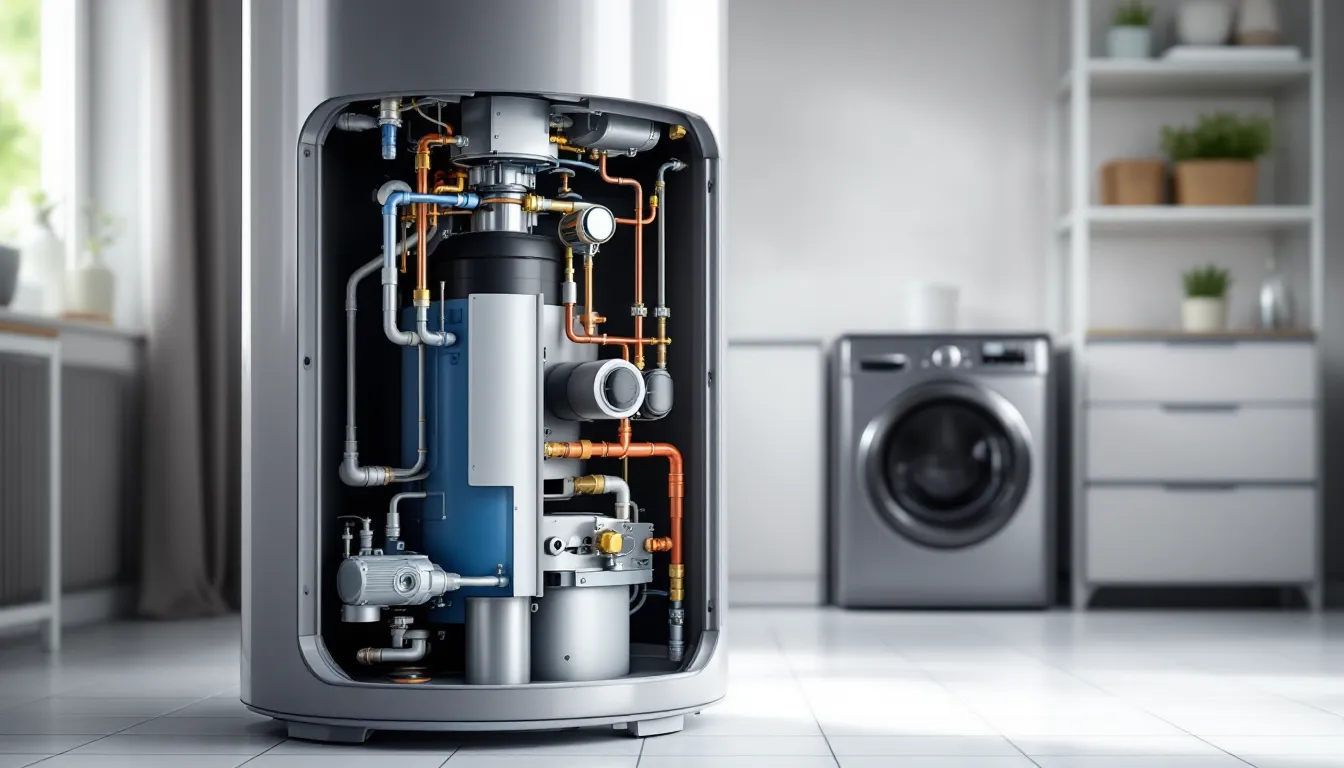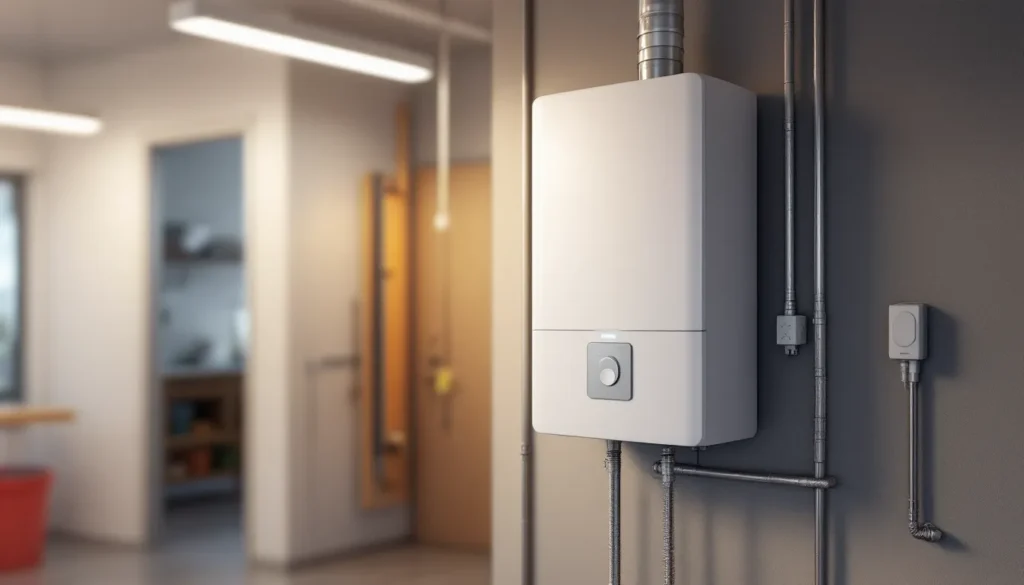Key Takeaways
- Energy Efficiency: Heat pump water heaters use up to 50% less energy than traditional systems, making them a cost-effective solution for heating water while reducing environmental impact.
- How They Work: These systems operate on a refrigeration cycle, extracting heat from the environment (air or ground) and transferring it to heat water, which is more efficient than direct heating methods.
- Cost Savings: While initial costs may be higher, the significant reductions in energy bills (typically between $300 to $600 annually) can lead to a quick return on investment and potential state incentives.
- Installation Considerations: Proper installation requires adequate space and ventilation, and it may necessitate a dedicated electrical circuit, making it important to account for these factors before purchase.
- Climate Performance: Efficiency can decline in colder temperatures; heat pump water heaters perform best between 40°F and 90°F, so homeowners in colder regions should evaluate their specific climate conditions.
If you’re looking for an energy-efficient way to heat your water, a heat pump water heater might be just what you need. These innovative systems use electricity to move heat from the air or ground to heat water, making them a smart choice for homeowners wanting to reduce their energy bills and environmental impact.
Unlike traditional water heaters that generate heat directly, heat pump water heaters work by transferring heat, which can lead to significant savings in energy costs. With their growing popularity, understanding how they operate and their benefits can help you decide if this technology is right for your home. Let’s dive into the world of heat pump water heaters and discover how they can transform your hot water experience.
What Is a Heat Pump Water Heater?
A heat pump water heater is an innovative system that heats water using electricity to transfer heat from the surrounding air or ground instead of directly generating heat. This technology significantly improves energy efficiency compared to traditional water heaters.
Heat pump water heaters operate using a refrigeration cycle. They extract ambient heat, even in cooler temperatures, and transfer it to the water tank. Typically, these systems can provide hot water for household needs while consuming 50% less energy compared to conventional electric or gas water heaters.
Key components of a heat pump water heater include:
- Evaporator: Absorbs ambient heat and converts the refrigerant into a gas.
- Compressor: Pressurizes the gas, which raises its temperature.
- Condenser: Releases the heat into the water tank, heating the water.
- Expansion Valve: Lowers the pressure of the refrigerant, enabling the cycle to repeat.
These systems come in various sizes and capacities, making them suitable for different household needs. They can also operate in various climates, as long as the ambient temperature remains within a range that allows for efficient heat exchange.
How Does it Work?

Heat pump water heaters operate using a unique refrigeration cycle that extracts heat from the environment, even in colder conditions. This process allows for efficient heating of water, making it a preferred choice for many homeowners.
Components of a Heat Pump Water Heater
- Evaporator: The evaporator absorbs ambient heat from air or ground. Refrigerant inside evaporates as it collects heat, changing from liquid to gas.
- Compressor: The compressor increases the pressure of the gas, raising its temperature. It pumps the heated gas to the condenser.
- Condenser: The condenser releases heat into the water tank. The gas cools and condenses back into liquid form as it transfers heat to the water.
- Expansion Valve: The expansion valve reduces the pressure of the refrigerant, allowing it to flow back to the evaporator. This cycle repeats continuously.
The Heating Process
During the heating process, the heat pump water heater draws in air or ground heat through the evaporator. The refrigerant vaporizes as it absorbs this heat. The compressor then compresses the vapor, increasing its temperature significantly. Next, the heated refrigerant moves to the condenser, where it transfers heat to the stored water. Finally, the refrigerant cools and returns to the evaporator via the expansion valve, ready to start the cycle again. This method consumes significantly less energy than traditional water heaters, offering efficient hot water production.
Benefits of Heat Pump Water Heaters
Heat pump water heaters offer numerous advantages, particularly in energy efficiency and cost savings. These benefits contribute to a more sustainable and economical choice for heating water in your home.
Energy Efficiency
Energy efficiency ranks as a primary advantage of heat pump water heaters. These systems can use up to 50% less energy than traditional water heaters, which translates into lower energy consumption and reduced environmental impact. By transferring heat from the air or ground, they operate more efficiently than conventional methods that rely on direct heating. Brands like Rheem and GE often highlight this aspect, promoting their units as environmentally friendly solutions suitable for various climates. You can enjoy consistent hot water while minimizing your carbon footprint.
Cost Savings
Cost savings emerge as another significant benefit of heat pump water heaters. While the initial investment may be higher than that of standard models, the reduced energy bills provide a quick return on investment. Many users report annual savings ranging from $300 to $600, depending on usage and local energy costs. Additionally, some states and utility companies offer rebates and incentives for installing energy-efficient appliances, helping offset the upfront costs. Over time, the combination of energy savings and incentives significantly lowers the total cost of ownership, making heat pump water heaters a financially savvy choice for homeowners.
Potential Drawbacks
Heat pump water heaters offer several benefits, but certain drawbacks exist that homeowners should consider before making a purchase.
Installation Requirements
Installation may require additional space and specific conditions. Heat pump water heaters typically need adequate indoor space, recommended to be at least 1,000 cubic feet for optimal air circulation. You may need to install a dedicated electrical circuit, potentially increasing installation costs. Proper ventilation is also necessary to prevent air from becoming too humid. If you live in a climate with extreme temperatures, additional considerations, like insulation and backup heating, might be necessary to ensure efficiency.
Performance in Cold Climates
Performance can decline in colder environments. Heat pump water heaters operate efficiently when the ambient temperature is between 40°F and 90°F. As temperatures drop, the heat pump’s efficiency decreases, leading to longer heating times and potential reliance on auxiliary heating sources. When outdoor temperatures fall below 40°F, the system may struggle to maintain the desired water temperature. Homeowners in colder climates should evaluate their local temperatures and consider hybrid systems or alternatives for peak efficiency during winter months.
Conclusion
Heat pump water heaters offer a compelling solution for those seeking energy efficiency and cost savings in their homes. By leveraging ambient heat from the air or ground, these systems significantly reduce energy consumption compared to traditional water heaters. While the initial investment may be higher and installation can require specific conditions, the long-term savings and environmental benefits make them an attractive choice.
As you weigh your options for water heating, consider how a heat pump water heater can fit into your lifestyle and budget. With the right setup, you can enjoy reliable hot water while contributing to a more sustainable future.

Hi, I’m Md Rofiqul, a gardening enthusiast who loves spending time in the garden and backyard. I enjoy caring for plants, growing flowers and vegetables, and creating a green space that feels peaceful and refreshing. Gardening is more than just a hobby, it’s a passion that connects me to nature and brings joy to my daily life. Living with plants inspires me to embrace simplicity, patience, and sustainability while making every day more colorful and rewarding.
